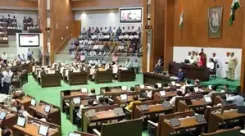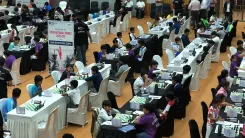Madras High Court Bench Steps Back from TASMAC Case

Synopsis
Key Takeaways
- The Madras High Court bench recused itself from the TASMAC case.
- The case involves ED raids that TASMAC claims were excessive.
- TASMAC has accused the ED of violating employee rights during the raids.
- Political controversy has arisen surrounding the ED's investigations.
- The case will be assigned to another bench for further hearings.
Chennai, March 25 (NationPress) The Madras High Court bench, which includes Justices M. S. Ramesh and N. Senthilkumar, announced on Tuesday that they are recusing themselves from the hearing concerning the Enforcement Directorate (ED) raids on the Tamil Nadu State Marketing Corporation (TASMAC).
The bench made this announcement at the beginning of the day's proceedings, stating they would not continue with the matter.
"We are recusing ourselves from the TASMAC case. We have our reasons. Initially, we had scheduled the hearing for tomorrow but had already signed the order for today. Later, we realized we could not proceed with this case. It will be forwarded to another bench," the justices remarked.
This case involves the ED's raids on TASMAC's locations from March 6-8.
TASMAC, which is the government-run liquor distribution corporation, filed a petition in the High Court, arguing that the raids were excessive and beyond the agency's authority.
Earlier, on March 20, the same bench expressed strong disapproval regarding the manner in which the ED conducted the raids.
The judges raised concerns over reports indicating that the ED restrained TASMAC employees and failed to provide reasons for the search operations. Consequently, the court instructed the ED to respond to the petitions submitted by both the State and TASMAC.
Additionally, the court orally directed the agency not to take any coercive measures against TASMAC officials during this period.
TASMAC's petition accused the ED of infringing employees' rights, including their privacy, by confiscating their mobile phones during the raids. Reports indicate that the agency entered the TASMAC headquarters in Chennai and conducted searches at multiple distilleries and bottling units throughout Tamil Nadu.
Conversely, the ED has alleged significant financial irregularities exceeding Rs 1,000 crore.
According to the agency, these irregularities involved tender manipulation, unreported cash transactions, and systematic overpricing of liquor at retail outlets.
The ED claimed that TASMAC stores were allegedly charging customers between Rs 10 and Rs 30 more per bottle than the printed maximum retail price (MRP), indicating a widespread overpricing strategy.
Furthermore, the ED reported substantial evidence of collusion between distilleries and TASMAC officials.
The agency alleged that distilleries collaborated with bottling companies to artificially inflate operational costs and document fictitious purchases. These activities were said to help divert large sums of unaccounted funds, which were allegedly used to bribe TASMAC officials for favorable supply orders.
The ED also raised alarms regarding irregularities in the allocation of transport and bar license tenders under TASMAC's jurisdiction.
These developments have sparked political controversy in Tamil Nadu.
The ruling Dravida Munnetra Kazhagam (DMK) accused the Central government of misusing investigative agencies like the ED to target state-run institutions and pursue political vendettas.
The Bharatiya Janata Party (BJP) dismissed these claims and emphasized the need for thorough investigations into the corruption allegations to ensure accountability.
TASMAC's plea sought legal protection for its employees and requested the court to prevent the ED from "harassing" them under the pretext of conducting an investigation.
With the bench's decision to recuse itself, the case is now anticipated to be reassigned to another bench of the Madras High Court for further hearings.







